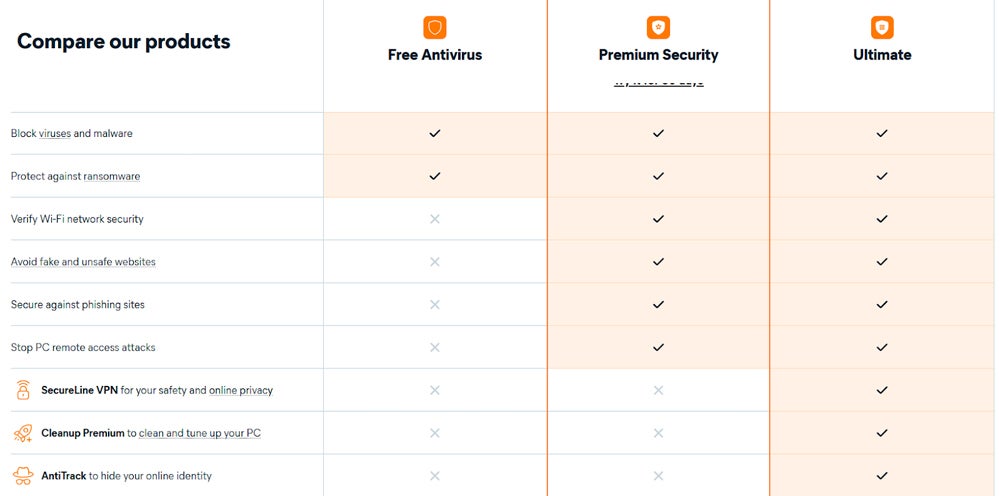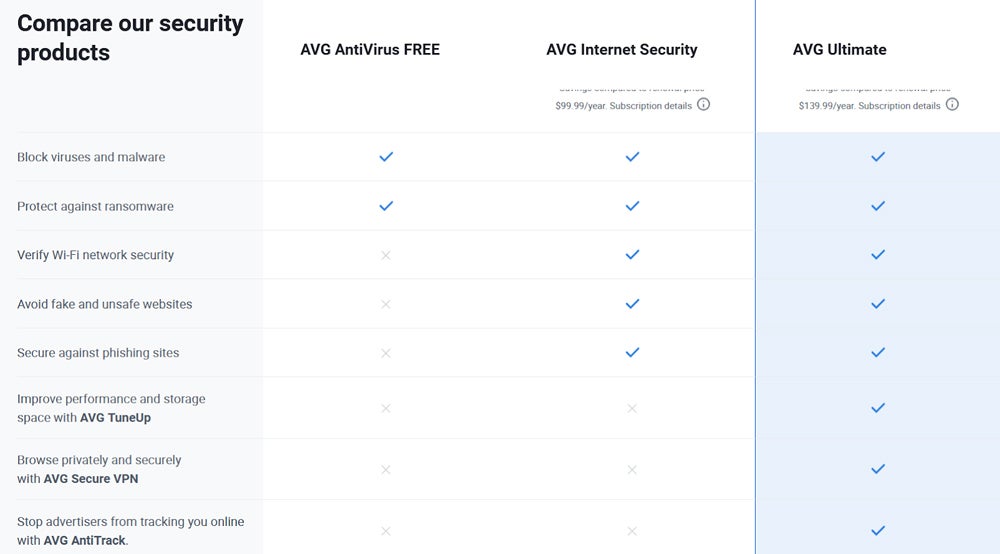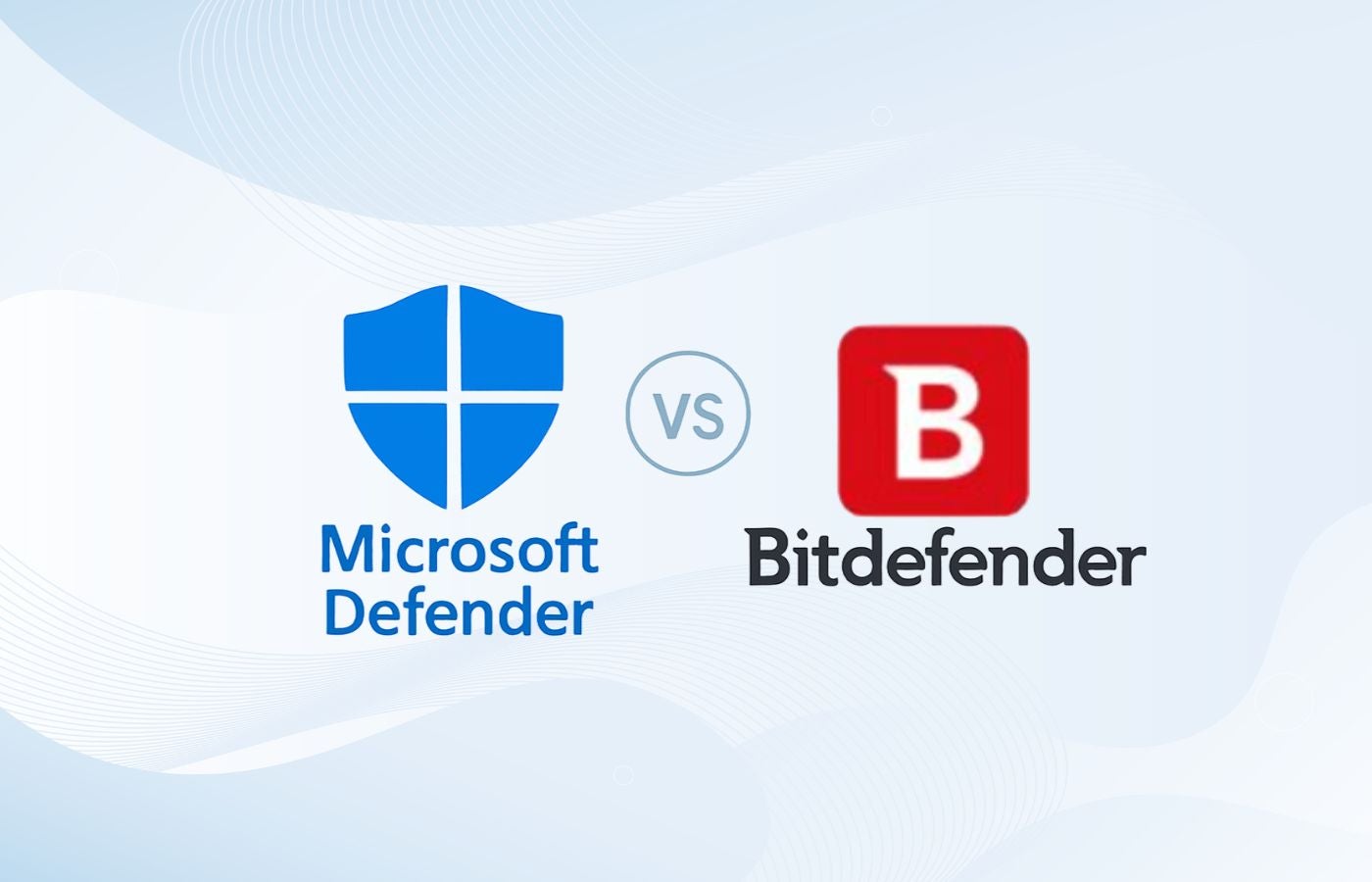An antivirus can offer some security for users worried about stumbling upon malware while browsing the Internet. A good antivirus can detect malware on whatever device the antivirus is scanning. In some cases, it can even remove that malware before it’s had a chance to cause much harm to the device or user, though this isn’t as common.
The antivirus industry can feel pretty big, so we’re gonna focus on only two platforms today: Avast and AVG. Both platforms are owned by the same company (Avast Software s.r.o.), but does that mean they’re the same product? Let’s find out.
Avast vs. AVG at a Glance
Let’s compare some basic pricing and features between Avast and AVG in a handy-dandy table before we look at them in more detail below:
 |  | |
|---|---|---|
| Lowest Annual Price* | $69.99 per year for the first year; $99.99 per year for subsequent years | $59.88 per year for the first year; $99.99 per year for subsequent years |
| Supported Operating Systems | Windows, MacOS, and Android*** | Windows, MacOS, and Android*** |
| Maximum Number of Devices Supported | 10 | 10 |
| Firewall | Yes | Yes |
| Malware Detection Rates** | 100% | 100% |
*While Avast and AVG both have free versions, those are not being considered for this review. Instead, I am looking at Avast Premium Security, AVG Internet Security, and any higher-priced subscription tiers.
**Malware detection rates in this table were pulled from AV-Test.org’s August 2024 Windows test. Detection rates from other websites, including AV-Comparatives, were used to evaluate the products.
*** While Avast and AVG both have iOS products, neither are antiviruses, and neither will be considered for this article.
Avast Overview
Overall Rating: 2.5/5
- Pricing: 2/5
- Core Features: 5/5
- Advanced Features & Integrations: 3/5
- Customer Support: 2/5
- Impact on Device Performance: 4/5
- Trustworthiness: 0/5

With its free version and decades of experience, Avast has become a household name in the antivirus space. That doesn’t mean it’s necessarily good. It has some things going for it. Its impact on device performance was relatively low, it scores well in independent testing, and its office management plan can be nice for businesses that employ many remote workers.
However, that’s where the positives stop, in my opinion. The service is expensive, and the features it does offer aren’t really all that different from most any other antivirus platform on the market. Additionally, while its test results are good, so are the likes of Microsoft Defender, Avira, and Bitdefender, which are all at equivalent prices or are cheaper.
Then we get to trust, which is my biggest issue with Avast. In 2020, the company harvested users’ browsing data, particularly data collected from Avast and AVG’s free versions and browser extensions, to be monetized through company subsidiary Jumpshot.
After being caught, the company defended this data collection as perfectly legal, promising to scrub collected data of identifying information. It did, however, reinforce its commitment to monetizing this scrubbed data by selling it to companies like Pepsi and Google, as reported by PC Mag’s Michael Kan.
While the company was first caught 4 years ago, this was not the end of the story. In February 2024, the FTC ordered Avast to cease “selling browsing data for advertising purposes” and to pay out $16.5 million for doing so. According to the FTC, this data harvesting has been happening since 2014.
While the FTC has banned Avast from continuing its data harvesting ways, I simply cannot trust a cybersecurity company I know has done this. A lot of what an antivirus gives users is peace of mind and a feeling of safety when using their computer. As such, trust is the most essential currency a company like this has with potential customers. Without that trust, why would you ever use software that requires so much data and access privileges on your device?
The bottom line is I wouldn’t trust Avast with my personal data, and I don’t think anyone else should either.
Pros & Cons
| Pros | Cons |
|---|---|
| Office management plan might be nice for remote workers | Has monetized user data in the past |
| Low impact on device performance | Expensive |
| Good independent test results | Runs on the same engine as AVG |
AVG Overview
Overall Rating: 2.5/5
- Pricing: 2/5
- Core Features: 5/5
- Advanced Features & Integrations: 3/5
- Customer Support: 2/5
- Impact on Device Performance: 4/5
- Trustworthiness: 0/5

Everything I said about Avast can be applied to AVG. The same company owns them, runs on the same engine, and, as briefly demonstrated in the comparison below, even uses the exact wording on their websites when describing certain features. These two have the same overall score because neither does anything that the other isn’t also doing.
This means AVG and Avast share many of the same positives (good independent test results, relatively low device slowdowns when in use) and negatives (too expensive without providing enough to justify the price).
It also means my trust issues with Avast are the same as those with AVG. The company’s data harvesting and monetization practices used antivirus-free versions and browser extensions. If you want my recommendation, I’d say stay far away from both providers.
Pros & Cons
| Pros | Cons |
|---|---|
| Nice collection of business-focused add-ons, including patch management | Has monetized user data in the past |
| Good independent test results | Expensive |
| Low impact on device performance | Runs on the same engine as Avast |
Best for Pricing: AVG
 |  | |
|---|---|---|
| Lowest Pricing Tier (Billed Annually) | $69.99 per year for the first year; $99.99 per year for subsequent years | $59.88 per year for the first year; $99.99 per year for subsequent years |
| Highest Pricing Tier (Billed Annually) | $69.99 per year for the first year; $139.99 per year for subsequent years | $59.88 per year for the first year; $139.99 per year for subsequent years |
| Free Trial | 30 days | 30 days |
Winner: AVG’s first-year annual pricing being roughly $10 cheaper gives it a slight edge over Avast, but this is as close to a tie as one can get without it actually being a tie.
Best for Core Features: Avast & AVG
 |  | |
|---|---|---|
| Endpoint Scanning | Yes | Yes |
| Antimalware | Yes | Yes |
| Web Browsing Protection | Yes | Yes |
| Ad Blocking | Yes, as a free browser | Yes, as a free browser |
Winner: Avast and AVG are owned by the same company and run on the same engine. In terms of core features, these two are identical. This includes the store pages for both products using the same wording for several of the listed features.
Best for Advanced Features & Integrations: Avast & AVG
 |  | |
|---|---|---|
| VPN | Yes | Yes |
| Password Manager | No | No |
| Firewall | Yes | Yes |
| Dark Web Monitoring | Yes, as an add-on* | Yes, as an add-on |
* Avast dark web monitoring feature is only available as part of the Avast One subscription. It cannot be purchased a la carte.
Winner: Once again, these two are more or less the same antivirus in different skins.
Best for Customer Support: Avast & AVG
 |  | |
|---|---|---|
| Support Forum/Customer Community | Yes | Yes |
| Support Hours | 24/7 | 24/7 |
| Phone Support (With a Human Agent) | Yes | Yes |
| Email Support | No | No |
| Live Chat Support (With a Human Agent) | No | No |
Winner: I’m sure it is a silly coincidence that the two antiviruses using the same engine and owned by the same company have the same customer support features.
Who Shouldn’t Use Avast or AVG?
In my opinion, no one should use either service. While this is a knock on their overall quality as products, it’s also just my recommendation to use antiviruses. The bulk of paid antivirus options don’t provide enough value for your money compared to cheaper options like Microsoft Defender, and the shady history of the free version of these antiviruses makes it impossible for me to recommend anyone use that either.
If you’re looking for a way to secure your business better, I would avoid antiviruses in most cases. The intense consumption of machine resources, high prices, and loads of feature bloat make most antivirus platforms not worth the money. Many antivirus providers also offer endpoint detection response (EDR) solutions that will better scale and suit the needs of most mid-size businesses.
2 Alternatives to Avast & AVG
Avast and AVG aren’t the only antivirus solutions on the market. Here are a couple of alternatives for your consideration:
Microsoft Defender
If you’re a PC user, the Microsoft Defender software with a Microsoft 365 subscription will, more often than not, be just as effective as any of the more expensive, more feature-burdened platforms. It scores well in virus detection tests run by reputable sites like AV-test and AV-Comparatives, and it lacks many bloatware and unnecessary features common in modern antivirus software.
Microsoft Defender is available as part of the Microsoft 365 subscription plan, which starts at $69.99 per year. Microsoft 365 also has features like identity theft monitoring, OneDrive file protection, and advanced email and calendar features for Microsoft Outlook, besides the Defender antivirus. Additionally, there’s Microsoft Defender for Business, which has plans starting at $3 per user per month for up to 300 users and up to 5 devices per user.
Malwarebytes
Malwarebytes is one of the only antivirus programs I would consider using. It scores well in virus detection tests while not, in my experience, causing the sort of intense slowdowns commonly associated with antiviruses. However, there is still a noticeable slowdown while in use. Malwarebytes’ plans can start at $3.75 per month for individuals and freelance users.
Malwarebytes’ Teams plan for businesses and organizations starts at $119.97 per year for 3 devices but can go up to 20 if necessary. Interested business clients can also look into the company’s managed detection response and EDR solutions.
How I Compared Avast & AVG
To grade Avast and AVG on a roughly even playing field, I created a grading rubric with 6 categories that interested buyers should consider when deciding which antivirus to buy. Two categories (Trustworthiness and Impact on Device Performance) did not get a dedicated section due to there not being much to compare within the format of this article. Still, they were briefly discussed in the overview for both products.
Pricing – 15%
I looked at the pricing on the lowest-available paid plans for both services. This was its Premium Security antivirus plan for Avast; for AVG, this was AVG Internet Security.
Core Features – 20%
I evaluated the availability of basic antivirus features for both Avast and AVG. Basic features included endpoint scanning and web browsing protection.
Advanced Features & Integrations – 10%
For this category, I analyzed some nice-to-haves for an antivirus, including a firewall and dark web monitoring. Password Managers and VPNs were also considered, though their impact on my overall grade was minor.
Customer Support – 10%
I checked out this category’s customer support options for Avast and AVG. This included determining if I could contact human customer support agents via phone or live chat, whether customer forums were available, and whether either company had 24/7 support.
Impact on Device Performance – 15%
I looked at how much each software slowed down or affected my experience using my device. This includes looking at browsing speeds and if either product’s web protection features are blocked or affected by any websites I commonly use throughout my day, like YouTube or Spotify.
Trustworthiness – 30%
Finally, I researched both companies’ histories for any notable data breaches or past shady activity, like if they had been caught selling user data. In my opinion, trust is the most important consideration factor with cybersecurity products, which is why it’s weighted so much higher than all other categories.
Bottom-Line: Avast vs. AVG
Avast and AVG are functionally identical antiviruses and are owned by the same company. That company used both antivirus-free versions and browser extensions to harvest user data that a subsidiary monetized. Even if these were the best antivirus products in the world, which they are not, I would never trust this company with my personal data, and I don’t think anyone else should either.






